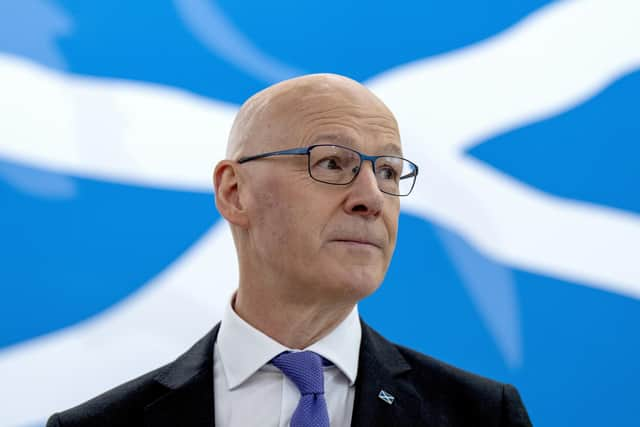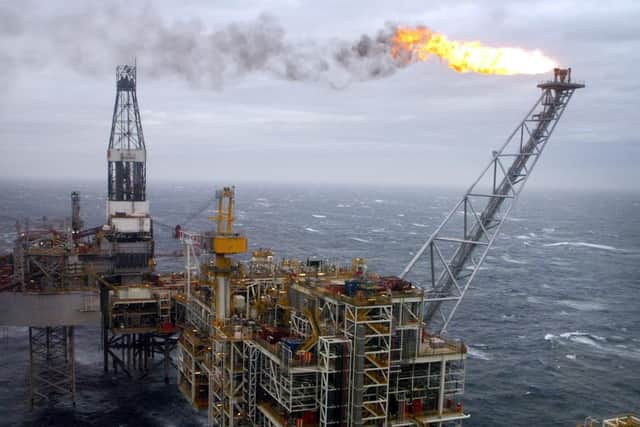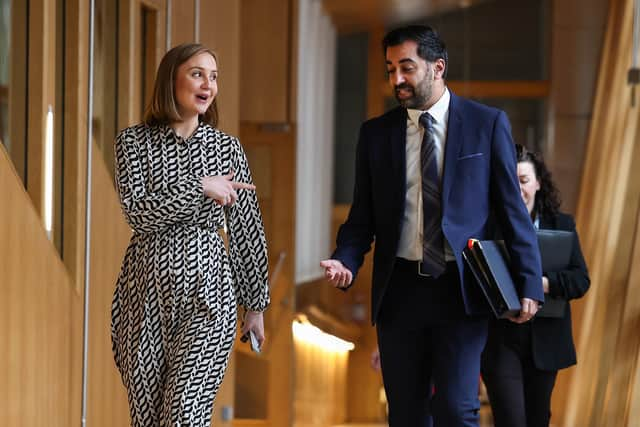The inside story on how Scotland’s climate change failure brought down Humza Yousaf's government as SNP ministers dealt further blow
Scotland has now missed nine of its last 13 annual climate targets – so it is no wonder SNP ministers are trying to scrap them and other legally-binding aims.
A failure to act on the climate crisis inadvertently brought down Humza Yousaf’s government, with the next steps on getting progress back on track now a crucial moment in giving the SNP any chance of clinging onto a reputation of taking the climate seriously.
Advertisement
Hide AdAdvertisement
Hide AdThe latest greenhouse gas emissions statistics, published on Tuesday, show that in 2022, Scotland had reduced emissions by 50.1 per cent since the 1990 baseline, but against a 53.8 per cent target.


Worryingly for the Scottish Government, there were increases in many sectors, including domestic transport, as well as rises in emissions for international aviation and shipping, land use, and forestry and electricity supply.
Even before the latest data emerged, the lack of progress that left ministers with no option but to draw up plans to weaken the targets essentially brought down the last Holyrood government.
Before news emerged the Scottish Government would acknowledge it had to alter its legally-binding targets, a source told The Scotsman “there will be movement on the 2030 targets soon”, starkly adding that “it won’t be pretty”.


When reports emerged that some Scottish Green members were less than impressed with the idea of rolling back Scotland’s legal climate aims, a senior party source said the episode had “severely tested the Bute House Agreement”. But the insider said they were “still really confident” that members would stick with the power-sharing deal amid threats from the junior partner to end it, adding “there was still a feeling it was better it be in the room at the table than merely looking in as an outsider”.
But within days, that role of the Scottish Greens was taken away by Humza Yousaf, in what proved to be one of the biggest errors of political judgement Holyrood has seen.
For Greens co-leaders Patrick Harvie and Lorna Slater, who were beckoned to Bute House first thing on April 25 to be told they were sacked as ministers and their party kicked out of government, it was deeply personal.
A source close to Mr Harvie said “it hurt a lot”.


They added: “The SNP had dropped the ball on the climate targets, years before the Greens had a chance to be involved in government. To then panic and kick us out and essentially try and blame us for their failures was a daft move from Humza.
Advertisement
Hide AdAdvertisement
Hide Ad“He clearly felt threatened by the suggestion the Greens and our members could take matters into our hand – it was a knee-jerk reaction”.
The Greens surprised no-one – except apparently Mr Yousaf and his inner circle – by refusing to back the-then first minister ahead of Douglas Ross’s fatal vote of no confidence in him. Despite Alba’s solo MSP and former SNP minister Ash Regan technically being able to save Mr Yousaf’s skin, it was, in truth, all over.
But the spark that lit the fuse – Scotland’s lack of progress in meeting legally-set climate targets – still hangs over SNP ministers.


SNP net zero secretary Mairi McAllan will soon be on maternity leave – but a long list of crucial decisions is unlikely to be able to remain paused until she returns. Scotland still has no climate change plan to work to.
Before the Bute House Agreement imploded, Ms McAllan had, very reluctantly, the support of the Greens to pass any amendments she needed to legislation to essentially rid Scotland of its annual targets and the 2030 ambition. That is no longer the case. It might be a different story to now ask the Greens, outside of government, to back Scotland weakening its climate targets.
A Greens source said the party “has very little confidence” that action on climate “will be ramped up” without them in the room.
They said “there is no guarantee we will help them weaken targets, especially if there’s no proper strategy to push forward progress”.
The SNP has relied on its climate credentials for a long time. Former first minister Nicola Sturgeon made no secret of her thirst to see Scotland as a global leader, using the COP26 climate summit in Glasgow in 2021 as a pivotal moment.
Advertisement
Hide AdAdvertisement
Hide AdThe Scottish Government under Ms Sturgeon and then Mr Yousaf successfully helped place the concept of loss and damage funds, reparations for those nations on the frontline of the climate crisis. Scotland has been a pioneer on that front. But action closer to home has, quite simply, moved off track.
John Swinney’s administration has insisted that net zero remains a priority for the Scottish Government. But tough decisions lie ahead. It is an obvious fact that delaying or watering down the tougher, unpopular decisions now will simply mean the public will be required to undertake more severe action later down the line.
Mr Swinney’s party is flirting with backing new oil and gas licences. North Sea fossil fuel licensing is reserved to Westminster, but the Scottish Government’s stance sends an important message to the industry, largely based in Aberdeen.
The Scottish Government’s energy policy, where its final oil and gas position will be confirmed, was due to be published by the end of the month. But that has been delayed due to the election for reasons outside the control of SNP ministers. That energy strategy was first promised by the spring of 2022.
The optics of Mr Swinney’s party pushing back on climate action in favour of oil and gas giants may help its fortunes in the short term in the North East at next month’s election. But the price of losing a reputation of being serious on tackling the climate crisis could be far more damaging.
Comments
Want to join the conversation? Please or to comment on this article.